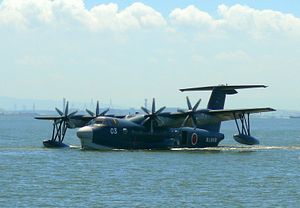This week, India and Japan have reportedly moved closer toward concluding the first-ever bilateral defense deal between the two countries, unnamed Indian military officials told Defense News. An official with India’s Ministry of Defense (MOD) claims that New Delhi and Tokyo have agreed on a price for 12 ShinMaywa US-2i amphibious search-and-rescue/maritime surveillance aircraft for service in the Indian Navy.
“Japan has offered a price concession of more than 10 percent per aircraft from $133 million per aircraft to around $113 million, and the $1.35 billion government to government deal for US-2 amphibious aircraft is now ready for finalization,” the official told Defense News on the condition of anonymity. Last week, Japanese defense contractor ShinMaywa Industries said that the Indian MOD has still not made an official request for the aircraft.
So far the Indian MOD has only indicated that it would like to purchase two US-2i aircraft in fly-away condition, whereas the remaining ten (sources say that the Indian Navy requirement is pegged at 12-18 aircraft) should be built in India under Indian Prime Minister Narendra Modi’s ‘Make in India’ initiative. ShinMaywa, however, thinks that license-building ten US-2i is impracticable and too costly given the small number of aircraft.
Consequently, while settling on a price shows some progress, it is far from a done deal, as a spokesperson from Japan’s (MOD) told IHS Jane’s Defense Weekly in early October. “In order to move on to stages of discussion on specific conditions of co-operation [the Japan] Ministry of Defense hopes that the Indian side will establish its procurement policy as soon as possible.” Furthermore, “after India has determined its procurement policy we would like to flexibly respond to requests from India and make our co-operation concrete.”
As the The Diplomat summarized in 2015:
Negotiations for a US-2 sale to India began in Japan under the Democratic Party of Japan (DPJ) governments of Naoto Kan and Yoshihiko Noda. The amphibious aircraft sale issue was swiftly picked up by Abe’s government, which has sought to expand Japan’s role as a defense exporter in Asia. In April 2014, the Abe administration formally altered Japan’s decades-old self-imposed ban on selling arms, which effectively blocked Japanese firms from participating in global defense commerce. (For more background on Japan’s export policies, see here.)
In December 2015, Indian Prime Minister Narendra Modi and Japanese Prime Minister Shinzo Abe agreed to deepen defense ties between the two countries specifically naming the US-2i aircraft as a project for future cooperation. Despite that, in March 2016, a senior Japanese government official said that there is no plan for “selling or delivering” the US-2i maritime surveillance aircraft in the immediate future.
“Given its range of 4,500 kilometers (2,796 miles), the Indian Navy was tentatively planning to station the USi-2 aircraft off the Andaman and Nicobar Islands in the Bay of Bengal, from where they would have been able to conduct surveillance patrols of the eastern Indian Ocean region,” I explained elsewhere.
The export of search-and-rescue aircraft would be Japan’s first defense deal in its post-war history.































